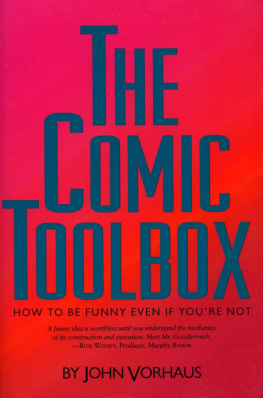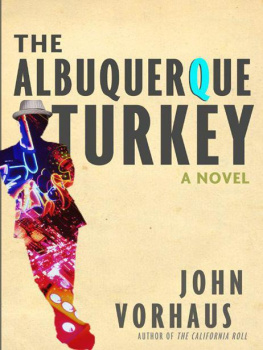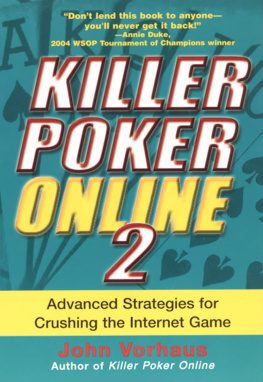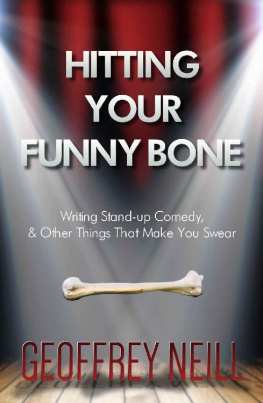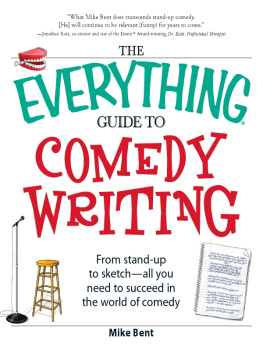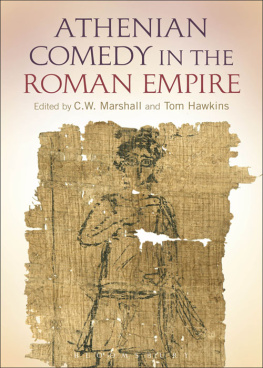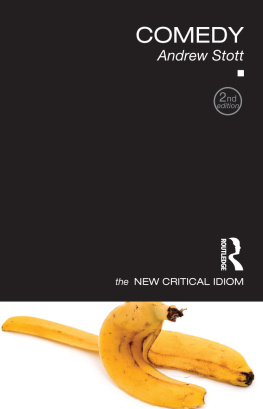If I thanked everybody there was to thank, the acknowledgements would run longer than the book. So thanks to Al and Louise, Nancy and Jim, who may have wondered but never doubted. Thanks to Bill for keeping me on the path and Scott for not letting me off the hook. Thanks to Cliff, who was there at the birth of the Toolbox. Thanks also to Linda and Barbara at the UCLA Extension Writers Program. Finally Id like to thank all my students, from whom Ive learned so much.
FORWARD!
to The Comic Toolbox
Are you one of those sorry folk
Who cannot write a decent joke,
Who cannot pen a funny scene
Because you lack the comic gene?
Are you convinced that you alone
Are cursed to walk this earth without a funny bone?
Take heart, dear friend, for now a book is writ
To guide you on your quest
To wrest from deep within, your native wit.
Voila! The Comic Toolbox by John Vorhaus
To save you from the jesters poorhouse.
It lays you certain basic rules
That aid the craft of serious fools.
Youll learn to slay that dreaded djin,
The Editor who lives within.
And once sprung from that self-constructed jail,
Youll then be free to risk and free to fail.
Free to find the premise, choose the word
That separates the master from the nerd.
So if you wish to tune your comic craft
And join the ranks of the professionally daft,
Then take this book of humor-honing tools
And join the ranks of jesters, clowns and fools
Who rise each day and, taking out their pen,
Bring joy and laughter to their fellow men.
Peter Bergman,
Firesign Theatre, Los Angeles, 1994
Introduction
T heres a book by William Strunk and E.B. White called The Elements of Style. When we read it in high school, my friends and I all called it The Elephants of Style, and you can be sure that we thought that this was pretty much the height of hilarity. Well, we also thought that drinking a great deal of Boones Farm apple wine and throwing up on neighbors lawns was a good idea, so draw your own conclusions. At any rate, The Elements of Style was a seminal bookit packed a ton of useful information about language and writing (and even, in its own offhand way, about life) into a very small number of pages. For a grammar text, it was, and remains, a remarkably good read. I recommend it.
Strunk and White were big on rules and not at all afraid to take a stand. They hated the passive voice, for instance, and insisted that use of the passive voice led to weak writing. Because I was young and impressionable when I read their book, I made this rule my own. For most of my writing life, I religiously purged the passive voice from my work.
And then one day I discovered how much fun it was to write in the passive voice. I knew it was wrong; Bill and E.B. had told me it was wrong. But I couldnt help myself. The words just came spilling out onto the page:
The room was walked into by a man by whom strong, handsome features were had. A woman was met by him. The bed was lain upon by her. Then the bed was lain upon by him. Clothing was removed from them both. Sex was had. Climax was achieved. Afterward, cigarettes were smoked by them. Suddenly, the door was opened by the husband of the woman by whom the bed was lain upon. A gun was held by him. Some screams were screamed and angry words exchanged. jealousy was felt by the man by whom the gun was held. Firing of the gun was done by him. The flying of bullets took place. Impact was felt by bodies. The floor was hit by bodies. Remorse was then felt by the man by whom the gun was held. The gun was turned upon himself.
And the rest, as they say, is forensics.
So slavish had I been in my devotion to the so-called rules of good writing that I had missed out on a piece of real linguistic merrimenta joke, if nothing else. In blind obeisance to the rules, I forgot to have fun. And jeez, if you cant have fun in writing, or painting or drawing, or acting or twisting balloon animals, or indeed any creative endeavor, why bother?
So I want to make one thing clear going in: The first rule is that there are no rules. Take all this stuff with a huge, crystalline grain of salt. My tools are my tools, designed for my convenience. If you find them useful, by all means use them. But theyre not gospel, for Gods sake, nor even elements of style.
On the other hand, I believe very strongly that the rules dont confine, they define. Creativity is problem-solving. The more (useful) rules we have, and the more rigorously we apply them, the more clearly we understand the problem were trying to solve, and the more success well have at solving it. For instance, if your car has a dead battery, its a rule that you connect the jumper cables plus-to-plus and minus-to-ground. Connect the plus terminal of one battery to the minus terminal of the other and youll end up with a fried battery, and possibly a fried face.
So as you poke around in this thing called The Comic Toolbox, adopt the useful fiction that everything in it is at least worthy of consideration. If you test these tools and find them user unfriendly, by all means reject them. In doing so, youll likely come up with some new ones of your own. Theyll be better for you, because theyll be yours, conceived by you in an idiom that you understand. But do try out all the tools.
And especially try the exercises.
Some may seem difficult, or irrelevant to your work, or just plain stupid. Try them anyhow, if only to prove how just plain stupid they really are. As Ill take pains to make clear later on, you wont be graded on your work, nor judged in any sensenot even by you. But you will get much more out of all this material if you put it into play while its all fresh in your mind. Scrawl in the margins if you like, or write down your answers in self-deleting computer files if that will help you minimize your emotional risk. But do try the exercises. Youll only get out of this book what you put in. Or to put it another way, the more you pay, the more its worth.
Several years ago, I taught a class called Writing from the Alien Perspective. As homework for that class, I assigned the following: Go out and do something new, something youve never done before. Some people paid for strangers meals. Some stole library books. Some played dumb. Some refused to do the assignment, which is something theyd never done before in any class anywhere. Some got arrested. It was that sort of exercise.
And we discovered something very interesting. The mere act of doing the unexpected thing created one funny moment after another. That revelation led to a new class, called The Comic Toolbox, and that class led to this book. So as you read the book, stop frequently to ask yourself how you can make your creative process fresh and new. Im not talking about what you write or draw or paint, but about the system by which you bring your material to life. Break old habits, even ones that work. Write in bed. Paint in the park. Draw cartoons on walls. Take yourself by surprise; the more you do this, the funnier youll be. If nothing else, youll have the experience of doing something new, and the new thing is almost always worth doing, if for nothing but the newness alone.

